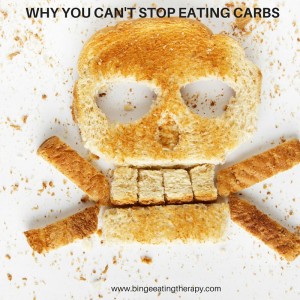 “Help! I can’t Stop Eating Carbs!!!!!!!!!”
“Help! I can’t Stop Eating Carbs!!!!!!!!!”
Because you shouldn’t.
“But carbohydrates make me fat!”
I’ve had several clients over the years come in believing this very thing, that eating carbohydrates would make them fat. So, what they would do was go on these all high-protein and high-fat diets, eating only eggs, bacon, butter, steak, water, vodka, and whatever else had very low or no carbohydrates in it for a few days, sometimes a week or two, then having a carb binge, only to beat up on themselves again and again, hating themselves for doing “the wrong thing.” Have you ever done this, or some variation on this?
Well, the truth of the matter is this, you can lose weight very quickly on an extremely low-carb diet. To say that’s not true would be a lie. However, it’s a bad idea. And it almost never works. And I know that because if it did, people would go on a very low-carb diet once, lose all the weight they wanted in a few weeks or months, and never look back.
Your body wants carbohydrates. It really does, and it runs more efficiently on carbohydrates and protein than on protein alone. Which is why starving yourself of carbohydrates will inevitably result in a carbohydrate binge (not to mention the strain it will put on your organs), and for most people, this isn’t usually a binge on garbanzo beans and yams, but on processed boxed foods (think Chips Ahoy, Twinkies, and Ben & Jerry’s).
Let’s look at why very low-carb diets result in quick weight loss. Your body relies on carbohydrates as quick energy, when you starve your body of carbohydrates, it’s going to have to go into your fat stores to burn for energy. Theoretically this sounds great. But, most people don’t get there. This is later on, after a few days when your kidneys have let go of all the water in your body. The initial dramatic weight-loss you experience is water weight, which is why if you eat like one potato chip, and knock your body out of ketosis (a state that very low-carb dieters strive for), and you will hold onto water again and feel as though you’ve gained all the weight back that you lost. This creates a really intense cat & mouse game between you and carbohydrates.
People tend to feel extremely grumpy, depressed and many experience some feeling of a cognitive decline when they are on very low carb diets long term, they have trouble with word recall, experience memory loss and battle with insomnia. If they are unable to stay on their low carb diet (not unusual) they start bingeing and feel grumpy because they’re bingeing… this is because your brain runs on glucose and depriving your brain of glucose in the form of a low carb diet can make one feel foggy, depressed, lethargic, and all around distressed. Because your brain is running less efficiently and your brain is foggy, it makes you more vulnerable to a binge. And what happens? You binge on lots simple carbohydrates – which then makes you more depressed and more apt to binge more.
When you don’t supply your body with any carbohydrates, it needs to slow down to preserve energy. This is why when people dramatically restrict their carbohydrates, they find that they are unable to exercise very much at all, they find that they are constipated due to lack of fiber, and they often become nauseated from ketosis. Because glucose stabilizes serotonin levels, some folks might find that they are depressed. Because your body runs so inefficiently on a very low carb diet, you will probably find yourself rebounding at some point with a carbohydrate binge. This sets up a cycle, again and again.
I had a client come in telling me, “I once lost 10 pounds in two weeks eating just steak and red wine, I know I can do it again…” and despite how much we worked on integrating healthy carbohydrates into her diet, her belief was that all carbs, in any amount were bad. So if she woke up in the morning and “accidentally” had a piece of toast with her eggs, she believed that her whole day was ruined and would continue throughout the day by eating ice cream, cake, cereal, pasta, whatever she could get her hands on, then use that as proof that carbohydrates were the problem. She would then hate herself. It wasn’t that one piece of toast that started the binge, despite the fact that she told herself that she couldn’t eat any carbohydrates because she was addicted. It was the belief that she couldn’t eat any carbohydrates and the black and white thinking that triggered the binge. She got so angry at herself every time she ate anything with carbohydrates in it and she got so angry at herself for the binges. Each time she started her diet again, she believed that this time it would be different. This time she could stick to it. Her body didn’t want her to stick to it. And when she didn’t, she blamed herself and her lack of willpower. Finally, after many, many years of this cycle, she agreed to try something different. She saw that she’d been doing this for so long and now weighed more than she ever had. She agreed that for just one month, just 30 days, she’d work in some balance. “I’m still not eating pasta or bread!” she told me. “That’s fine,” I told her, “but what about some apples, some sweet potatoes, some onions and peppers, some beans…” She agreed and began bringing unprocessed carbohydrates into her regimen. She decided that for the month she would “eat anything that grew,” which was something that she’d read in Louis Hay’s You can Heal Your Life. Not forever, just for 30 days.
Our start date for her experiment was April 1st of last year and she agreed to go until May 1st without succumbing to the lure of a no-carb diet. Despite the fact that she was allowing herself to eat more, each day was a struggle because she really wanted to give in to her desire to reject carbs. As we discussed it over the month, she realized that a huge part of her wanting to control her carbs so intensely was also a desire to have some control in her life. When she gave that up, it opened up more space for us to discuss in therapy what was actually going on in her life that felt totally out of control, such as her career, her relationship, and some of her friendships. As carbohydrates stopped being the center of her focus, her real life, which was admittedly difficult, became something that she was actually able to focus on in therapy. Each day in April she let herself experiment with different whole food carbohydrates, such as potatoes and sweet potatoes, yams, apples, bananas, avocados, sushi with the rice, and she even ate pasta once or twice without bingeing on it, which shocked her.
The magic that happened in that month was the letting go. As she was able to work on what was really going on inside of her and allow herself to eat really healthy whole foods, she began to let go of bingeing. Those ten pounds that had been haunting her for years didn’t magically fall off in a month, but about 2 or 3 pounds did. No, it wasn’t the ten pounds in two weeks that she was hoping for, but the promise of that was what kept piling the pounds on year after year after year.
As of right now, she’s not on a no-carb diet, and she’s not on a high carb diet. She is just trying to be nutritionally savvy. She eats whole foods, and exercises and has recently began to feel at peace with her body. She has certainly lost weight and come to a comfortable place for herself physically, but that’s not what makes this important, what makes it important is that when she stopped obsessing, she was able to come home to herself.
That doesn’t mean that taking care of yourself by choosing not to eat certain refined carbohydrates is a bad thing, however it might be good to reframe your thinking not as a “low-carb” diet but as a “whole foods” way of eating. Allowing yourself healthy whole foods will do nothing but nourish your body. And if you wind up eating a piece of cake or some pasta once in a while, it doesn’t mean you’ve failed miserably, you haven’t knocked yourself out of ketosis and you don’t have to binge. This is just about being good to your body by choosing to bring in healthy whole foods rather than reject carbohydrates totally.
Most people find that they are able to fend off bingeing much more effectively when they reintegrate both carbohydrates and proteins into their daily meals. So go ahead, eat that potato and let go of the guilt. Carbs are not the enemy, in fact they will make your brain happier, calmer and you will begin to find more peace when you are integrating whole protein, fat and carbohydrates all generously back in to your daily diet.
Online Binge Eating Treatment - LEARN MORE!
EVIDENCE BASED INTERVENTIONS THAT REWIRE YOUR BRAIN TO:
-
STOP BINGE EATING
-
AUTOMATICALLY MAKE HEALTHY CHOICES
-
GAIN A FEELING OF PEACE AND CALMNESS IN YOUR BODY
-
RECOVER FROM BINGE EATING FOR GOOD



 Follow
Follow
